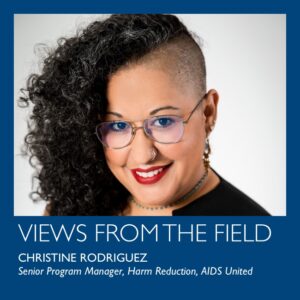Christine Rodriguez, MPH, Senior Program Manager, Harm Reduction, AIDS United
Syringe services programs (SSPs) have existed, mostly under the radar, in the United States since the early days of the response to the HIV epidemic. Illegal then, and still illegal in many jurisdictions across the country today, sterile syringe access is a bedrock of harm reduction—a service created by people who use drugs to save their own lives and those of their loved ones. Despite the many misconceptions about what they do and how they operate, SSPs enjoy a long history of robust evidence for their effectiveness in impacted communities. While the provision of sterile syringes and other drug use supplies is a core offering, the range of services an SSP might offer with adequate resources is nearly limitless and defined only by local needs. Services can and do often go far beyond just substance use and infectious disease response.
SSPs around the U.S. offer anything from safer use education to naloxone for fatal overdose prevention; showers and laundry to medication storage; linkage to health, behavioral health, and social services to support groups; clothing closets and food pantries to hygiene kits. They serve among the most marginalized of our neighbors—who are at the margins because our society and social systems have pushed them there. Yet time and again, health equity funding seems to miss the importance of these programs, which represent an alternative health care infrastructure for drug users who our existing systems have treated with indifference at best and outright contempt and violence in many cases. While health equity funders support our safety net providers with enthusiasm, those in harm reduction inflating the emergency air cushion below that net remain forgotten and severely under-resourced, despite an estimated 650 percent return on investment related to HIV-related costs alone.
SSPs ultimately serve, within the context of a contaminated illicit drug supply and prohibitionist policies, to keep people alive and as safe and well as possible until their next step—whatever that looks like. These interventions are successful when there is deep relationship-building in the community, and those relationships are centered in compassion, dignity, nonjudgment, and respect for people who use drugs and their bodily autonomy. Doors to often-abusive systems are reopened for those seeking primary or specialty health care and other services. They create circumstances where the safety net becomes available again. Instead of being demonized and seen as “controversial,” SSPs should be lauded for this powerful, transformational work. Trust for America’s Health furthered this idea in 2019 in their report, Promoting Health & Cost Control in States: How States Can Improve Community Health and Well-being Through Policy Change. In this report, “employ[ing] harm reduction strategies to prevent substance misuse deaths and related diseases” is one of just six goals and supporting syringe access programs is one of only 13 recommendations. Support for SSPs is happily and unremarkably listed here right alongside interventions like universal Pre-K programs and paid family leave. As they should be.
Achieving health equity necessitates caring about and addressing drug user health, and SSPs are a shining example of how to do so. Health philanthropy, then, must begin to truly invest in drug user health as well. There are now more than 450 known SSPs across the country, all with significant needs outpacing their ability to meet them. Local foundations can and should support those in their communities. Larger foundations, those seeking a broader impact, and/or those without local programs to support should consider options such as investing in AIDS United’s collaborative intermediary fund, the Harm Reduction Futures Fund, which is staffed by those in relationship with the community who can ensure grants get to high-quality applicants given our subject matter expertise and with the indispensable help of a community-based external review committee.
Drug user health should not be considered niche in philanthropy, much less in health or health equity-focused philanthropy, but rather a core piece of addressing our mutual goal of realizing health justice for ALL communities. As the racial disparities in outcomes like accidental overdose mortality widen, equitable access to SSPs becomes even more imperative. Whether your priorities include ending the HIV epidemic, addressing viral hepatitis, or stemming the tide of fatal overdose—or you are just concerned with issues of health equity broadly—funding SSPs is critical. These programs have stretched a dime into a dollar, fended off threats and harassment, and been constantly on the defensive for three decades. Staff have done—and, in some jurisdictions, continue to do—this lifesaving work even at the risk of arrest and incarceration for what, from my perspective, amounts to truly righteous civil disobedience.
Despite staggering losses to both HIV and overdose, countless more lives would have been lost without their efforts. And their work continues despite our community reeling for years now from relentless grief, especially frontline workers. It is beyond time we return the favor and provide not just adequate but robust funding for these innovators and harm reductionists committed to the philosophy behind the work—those who do this work because there simply is no other choice. There is no other approach. For people who use drugs, it is now as always quite literally a matter of life and death.
The Harm Reduction Futures Fund exists to both imagine a new future for people who use drugs and to support those creating that future as we speak with every compassionate encounter. We hope you’ll join us.
Reach out! For questions about the Harm Reduction Futures Fund; exploring collaborations; discussing major gifts or grant opportunities, and/or assistance identifying an SSP in your area to support, please feel welcome to contact Christine directly at crodriguez@aidsunited.org. You may also reach our team at harmreduction@aidsunited.org with any inquiries.

